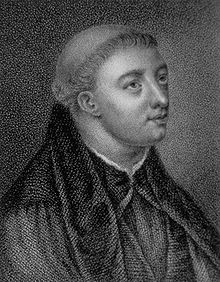- John Lydgate
-
John Lydgate (cerca 1370-1451), monje y poeta inglés, nacido en Lidgate, Suffolk, Inglaterra, y muerto en Bury Saint Edmunds, Suffolk.
Contenido
Vida
Entró a los quince años en el monasterio benedictino de Bury St. Edmunds a los quince años y se hizo monje tres años más tarde.
Al tener ambiciones literarias (admiraba a Geoffrey Chaucer, siendo amigo de su hijo, Thomas) buscó y obtuvo el patrocinio para sus obras en la corte de los reyes Enrique IV, Enrique V y Enrique VI. Además, consiguió el mecenazgo del alcalde y miembros de la corporación municipal de Londres, del capítulo de la Catedral de San Pablo y de Ricardo de Beauchamp (1382-1439), decimotercero Conde de Warwick. Su mayor apoyo fue, desde 1422 Humberto de Gloucester (1390-1447), quinto hijo del rey Enrique IV.
En 1423 John Lydgate fue nombrado prior de Hatfield Broad Oak, Essex pero pronto renunció al cargo para concentrarse en sus viajes y sus escritos. En sus últimos años vivió y probablemente murió en el monasterio de Bury St. Edmunds.
Obra
Fue un escritor prolífico de poemas, alegorías, fábulas y romances, si bien sus obras más famosas fueron sus largos y célebres poemas narrativos Troy book ("El libro de Troya ", comenzado en 1412), Siege of Thebes ("El asedio de Tebas", de 1422) y la Fall of Princes ("La caída de los príncipes"). Los dos primeros son ciclos legendarios inspirados en los clásicos, que se proponen encontrar los males sociales y corporales en las guerras de facciones y en la ambición personal; el último es una colección de ejemplos didácticos para poner en guardia frente a los avatares de la Fortuna. Otras obras: The Life of Our Lady (Vida de Nuestra Señora), The Dance of Death (Danza de la Muerte) y The Temple of Glass (El templo de Cristal).
Fue apreciado por sus contemporáneos, probablemente por su elocuencia y por el estilo rebuscado, pero con el tiempo su obra ha sido vista como un paso atrás respecto a las innovaciones de Chaucer, a quien pretendía imitar. Respecto al maestro, Lydgate tiene un horizonte intelectual más estrecho, poco realismo y un uso equivocado del didactismo. Se le reconoce sobre por haber hecho accesible al inglés muchos relatos y romances clásicos.
Se le atribuyó el London Lickpenny, una obra satírica bastante conocida, pero su autoría es muy discutida.
Curiosidad
El Oxford English Dictionary encuentra en Lydgate el primer registro de la voz talent (talento) en el sentido de una habilidad natural para algo.
Enlaces externos
- Obras de John Lydgate en el Proyecto Gutenberg.
- Canon de John Lydgate en la Universidad de Alberta, Canadá
- Biografía de John Lydgate en la Enciclopedia Católica
Categorías:- Benedictinos
- Escritores de Inglaterra
- Escritores en inglés
- Poetas de Inglaterra
- Nacidos en 1370
- Fallecidos en 1451
Wikimedia foundation. 2010.

